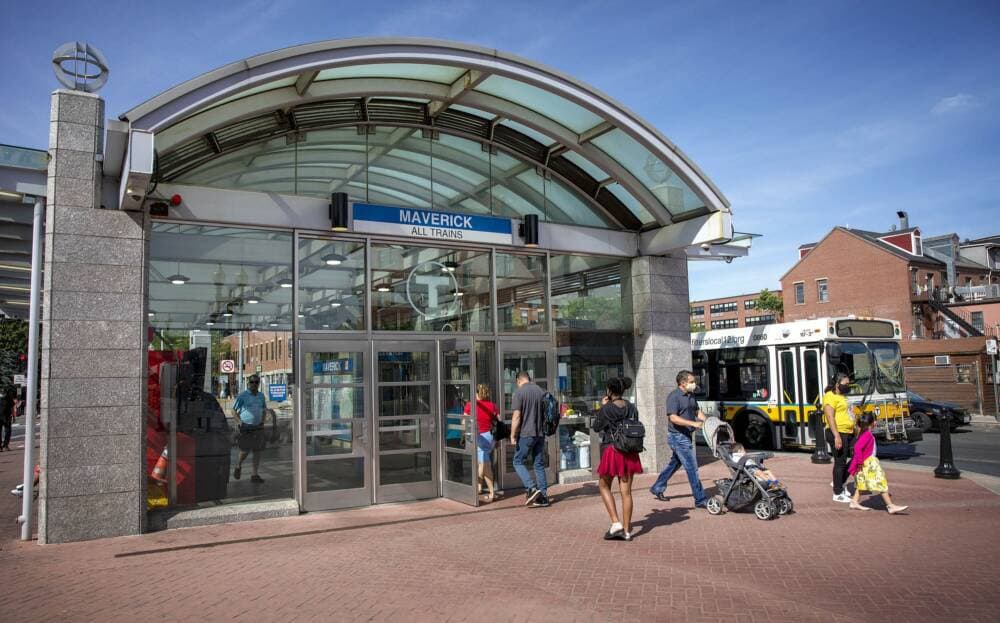Advertisement
Boston's Morning Newsletter
Phil Eng's first steps for fixing the T begin next week on the Blue Line

Editor's Note: This is an excerpt from WBUR's daily morning newsletter, WBUR Today. If you like what you read and want it in your inbox, sign up here.
Ninety-minute commutes from Quincy to Cambridge. Workers at risk of losing their job after repeatedly arriving late due to delays on the MBTA. Riders considering walking instead of braving the Red Line. Lost shuttle buses. Escalator phobia. A general “degrading” feeling.
Phillip Eng got an earful Wednesday during his first board meeting as the MBTA’s new general manager. Riders vented about the system’s debilitating slow zones, service cutbacks and safety problems.
In response, Eng said he hears the frustrations and pledged an “enduring effort” to rebuild the T’s reliability and safety culture.
So, where does it start? Here are the first steps Eng outlined:
1. An early bedtime for the Blue Line? Remember last week’s nighttime Blue Line closure? Eng revealed Wednesday the T is planning similar closures over the next two weeks — but starting even earlier at 7 p.m. The nighttime diversions are scheduled for April 24 to 27 and May 1 to 4, with shuttle buses running between Government Center and Wonderland.
- The approach will give crews over triple the time each night to work on lifting the Blue Line’s 21 speed restrictions (and 69 track defects) that are bogging down roundtrips by over 15 minutes.
- Eng said the T is aiming to remove all downtown Blue Line slow zones — or between Bowdoin and Aquarium stations — by May. But it wouldn’t be until November that the East Boston and Revere stretches are back to full speed.
- Why is the Blue Line getting priority? T spokesman Joe Pesaturo says they want to get as much of the line back to normal speed before the two-month closure of the Sumner Tunnel in July.
2. What about the other lines? Eng plans to release a similar repair timelines for the whole system.
- That includes the Red Line, where the total delay from speed restrictions is now near 80 minutes roundtrip, according to TransitMatters’ slow zone tracker. The Red Line is slated for another big downtown diversion this weekend, and Eng said they’ll release the long-term repair schedule “shortly.”
3. Jobs, jobs jobs: The T hosted its first job fair this past weekend saw a “very strong turnout,” according to Eng, with 300 people applying for positions. It’s a crucial step to address a staffing shortage estimated to be near 2,000 workers and bring back more frequent bus and train service.
- Psst: Eng said the job fair made the application process significantly easier — and there are more of them coming in the weeks ahead in Quincy, Lynn and Revere. He also called on MBTA staff to make the normal application process “less onerous.” “Time is of the essence here,” he added.
- Remember, the T is now offering $7,500 sign-on bonuses for many open positions.
The abortion pill mifepristone will stay on the national market until at least Friday, after the Supreme Court extended its freeze yesterday on any changes. The move gives the court a few more days to consider the Justice Department’s request to block a Texas judge’s ruling that would revoke the FDA’s approval on the commonly used drug.
- The local angle: However the Supreme Court rules Friday, don’t expect to see any immediate changes in Massachusetts. WBUR’s Martha Bebinger reports local hospitals and abortion clinics say they will disregard restrictions on mifepristone, as state officials work to stockpile the pill.
PSA: Police are asking for the public’s help finding a 13-year-old missing East Boston girl. Authorities say Emily Souza was last seen Saturday on Lubec Street. Anyone with information is asked to call 911 or contact the local precinct in East Boston at 617-343-4234.
Set a reminder: Tickets for the Boston Symphony Orchestra’s free “Concert for the City” go on sale today at 10 a.m. The Boston-centric program for the May 7 concert includes special guest Mayor Michelle Wu on piano and music from the Dropkick Murphys, among others.
P.S.— Need a podcast to binge during April school vacation week? The first five episodes of Violation are now out. This is WBUR and The Marshall Project’s new true crime exploration of America’s opaque parole system through a 1986 murder case and the latest episode examines what life is like for the millions of people on parole — including the restrictions and surveillance they face. Listen to it wherever you get your podcasts.
